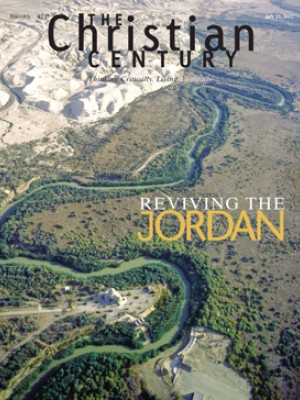Acquainted with grief: The church’s way with death
In a famous scene in the film The Sixth Sense, a haunted little boy tells his psychologist that he sees dead people. The doctor asks, “How often do you see them?” The child replies, “All the time. They’re everywhere.”
As a pastor, I know how he feels. I see them too. At least, I almost do. Years ago, at the end of a three-week stretch that featured four funerals, I went for a jog through my neighborhood. As I ran past houses and apartment buildings, I glanced at the ones where my parishioners lived, and I thought, “They are all going to die. Each one of them will have a coffin.” I don’t see ghosts. But I do see people headed toward the grave. They’re everywhere, especially at church. That is one of the things that church does. It introduces us to a bunch of mortals.
This sounds ridiculous. Every person we meet is going to die. It doesn’t matter if the introduction is made at church or at a child’s birthday party. The difference is that no one has ever stood up at a child’s birthday party to read a list of those who have died in the year between today’s cake and last year’s celebration. But many churches do just that on All Saint’s Day. People are dying all around us. We would rather ignore this fact, but the church won’t let us. Indeed, if I didn’t go to church, I’d be tempted to believe that the only people who die are celebrities.
Read our latest issue or browse back issues.
This will change as my peers and I age, but at this point in our lives, most of my friends outside the church are living in an age-segregated bubble where death remains a distant, hidden thing. When Steve Jobs died, his sister Mona Simpson delivered a widely read eulogy that was published in the New York Times. An old friend e-mailed it to me with the subject line: “This is the most beautiful thing I’ve ever read.” After I read her words, I shrugged and thought, “I’ve heard better.”
Mona Simpson didn’t move me to tears, but at a funeral a few days earlier, a church member’s son made me cry when he stood at the lectern and said that every time he ever encountered his father, whether it was as a child when his dad picked him up at school, or when he was a teenager and he walked downstairs and into the kitchen late on a Saturday morning, or when he was a grown man and he visited his father in hospice care, every time—every single time—his father’s eyes lit up. His son said, “Every time I ever stepped into his presence I knew that my dad felt joy to see me.”
I hear beautiful eulogies all the time—not because the eulogists are better writers than Mona Simpson but because the church has let me grow to love the ones whom we are grieving. I have grown used to mourning. This means that when death comes for my loved ones, the fact of mortality is not going to blindside me. I will still grieve, of course. But death itself will not surprise me. I already know its sting. I have grieved before. This is true for anyone who joins a church. But it is not always true for others.
Several times each year I work with grieving men and women who have not stepped into a church in ages. I recently planned a funeral for a 97-year-old woman. I did the preparation with her grandson, a very fit, very alive man in his early fifties. As we walked through the sanctuary on our way to my office, he told me that he had not been in the church since his confirmation. “It hasn’t changed a bit,” he said.
When we sat down he immediately broke down. He told me, “I can’t believe she’s gone. It is so unfair. How could she be dead?” I am enough of a pastor to know not to answer such questions, but some part of me, probably the part formed by the church, wanted to reply, “Ninety-seven? That’s how.”
Not only did the poor man have to grieve his grandmother, he also had to wrestle with the concept of death. He was suddenly confronted with the fact of death, with the imminence of his own death and with the inevitability of his children’s deaths. He was suddenly aware of the specter that looms over all of us, a power we try so hard to avoid seeing, but a power that the church forces us to reckon with.
Regular churchgoing does not make you a friend of death, but if you sit in the pews long enough, you cannot help getting acquainted. In the church you meet some lovely people. And some of them die during your time there. This is a most unlikely gift, but it is a gift that churchgoing keeps on giving. It starts early, gradually, as children form friendships with elderly adults who are not their parents.
I still remember the first funeral I attended. It was for one of my Sunday school teachers, a woman in her eighties named Mrs. Newhouse. I still remember the minister standing over her coffin and reading these words: “We are conscious of others who have died and well aware of our own frailty on this earth.”
Those sentences did not have anything to do with Mrs. Newhouse (which isn’t to say that we didn’t grieve her death that day; plenty of tears were shed). But the pain we experience at the death of a friend is more slippery than it first appears. Perhaps some of the tears we spill are actually shed for ourselves. Mrs. Newhouse’s coffin pointed toward my own. “Jesus wept,” the gospel says. But he didn’t weep in the abstract. He cried at the grave of his friend, just when he was beginning to realize the inevitability of his own death. Standing before his friend’s grave, Jesus was suddenly, even rudely, reminded of the frailty of his own existence on this earth.
When we mourn at funerals, we don’t only grieve the dead. We are also the objects of our own despair, which means that when our tears have dried, we emerge rehearsed and readied for the inescapability of our own death. Of course, our faith proclaims that death precedes resurrection, rather than being an end unto itself. But that is a future promise. In the meantime—that is, this lifetime—death remains a fact, but a fact whose grip grows weaker as it becomes familiar.
All of this is to say that I see a difference between the grief of active churchgoers and the pain of those who stay away. Everyone hurts, of course. But when death comes for a family member, there is often a sturdiness, a resiliency and a healthy sort of acceptance in the eyes of those who have baked cookies to serve at memorial teas, who have sung hymns at funerals of old saints or who have sat down, surprised to see an empty spot in the pew where a friend from a church committee had worshiped only weeks before. Churchgoers have grieved before; they’ve already felt death’s sting.
In their pain I see a strength that exists before I begin my uncertain, pious talk about the afterlife—a realism and grit that might surprise those who assume that Christian comfort rests on nothing but belief in things unseen.







